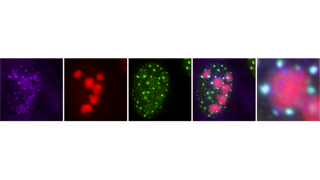Genetic predisposition to greater muscle strength predicts better functional capacity and protects against common diseases in aging

In her doctoral research, MSc (Health Sciences) Päivi Herranen developed a genetic indicator known as a polygenic score to capture the combined influence of over one million genetic variants on an individual’s muscle strength.
“The study showed that a genetic predisposition to higher muscle strength consistently predicted better outcomes in measured muscle strength, physical functioning, and activities of daily living performance,” Herranen explains.
Genetic muscle strength was linked to lower morbidity and mortality
According to the study, higher genetic muscle strength was associated with a lower risk of developing several common diseases and with reduced mortality, particularly due to cardiovascular diseases. In contrast, genetic muscle strength did not predict better recovery from acute illnesses or injuries.
“These findings suggest that a genetic predisposition to be physically strong may reflect an individual’s intrinsic capacity to resist age-related adversities, rather than a capacity to fully recover after severe health events,” Herranen says.
The study also observed that individuals with a genetic predisposition to lower muscle strength could partly compensate for it through more active lifestyles. However, the association between genetically determined muscle strength and lower mortality risk remained independent of the level of physical activity.
Findings open opportunities for individualized risk assessment
The independent predictive ability of the polygenic muscle strength score was modest but comparable to that of many lifestyle factors.
“As genetic methods continue to advance, such measures may in the future complement personalized health risk assessments and support predictive models of healthy aging,” Herranen notes.
Public examination
Päivi Herranen will defend her doctoral dissertation, “Polygenic inheritance of muscle strength as a predictor of old-age adversities, recovery, and survival,” on 28 November 2025 at 12:00 in the old assembly hall S212, Seminarium building, University of Jyväskylä. The event can also be followed online at https://r.jyu.fi/vaitos-herranen-281125.
The opponent will be Professor Paolo Caserotti (University of Southern Denmark), and the custos will be Associate Professor Elina Sillanpää (University of Jyväskylä). The event is held in English.
Published information
The dissertation Polygenic inheritance of muscle strength as a predictor of old-age adversities, recovery, and survival is available in the JYX publication archive: https://urn.fi/URN:ISBN:978-952-86-1079-3
Background information
Päivi Herranen graduated from Simonkylä Upper Secondary School, Vantaa, in 1993 and qualified as a physiotherapist from the Helsinki IV School of Health Care in 1997. She completed her Master’s degree in Health Sciences at the University of Jyväskylä in 2018, majoring in Gerontology and Public Health. Since 2021, she has worked as a grant-funded and doctoral researcher at the Gerontology Research Center, Faculty of Sport and Health Sciences, University of Jyväskylä. Currently, she works in research positions at the Folkhälsan Research Center.
Further information
Päivi Herranen
+358 50 358 3399
paivi.herranen@folkhalsan.fi




